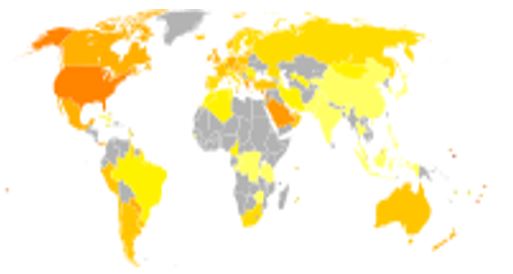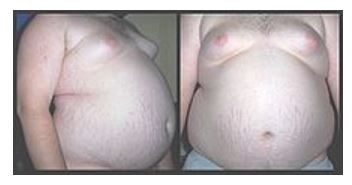Introduction
Over the years, the world has experienced increasing trends in the dominance of obesity and overweight characterized by excess body fats as well as body weighing more than the normal mass considering the ages and heights of the individuals. More specifically, the prevalence of obesity has been on the increase among the grown-ups in the United States and South Australia thereby creating major health challenges to the victims (Levy-Navarro 231). According to the World Health Organization, obesity has been declared as a worldwide pandemic owing to its escalating trends not only in the US and South Australia but also around the globe. In this regard, several definitions have been advanced to explain obesity by different organizations. Just to begin with, according to the centers for disease control and prevention, obesity results when an individual’s body mass index falls within the range of 25% and above (Tsigosa 9). Worth noting, over 27.3% US adult overweight populace is expected to register an increasing weight tendency in the next 4 years translating to about 115 million casualties of the epidemic.
The prevalence of obesity
Obesity arises from lack of balance between energy consumption and energy expenditure. In England, France and Korea, there has been a steady augmentation in the number of obese children at a rate of about 7%. The trend has been upsetting among the adolescents thereby initiating an ever-increasing health challenge around the world (Kopelman 58). Further, according to the World Health Organization, obesity is responsible for over a million deaths and about 11 million cases related to life-years of ailments. Overweight exposes individuals to the threats of cardiovascular diseases, diabetes, mental disorders as well as orthopaedic concerns. Further, the epidemic can lead to underperformance and low confidence among children.

Obesity increases with color intensity from yellow at 5% to dark red at 45%.
In the modern society, the individual energy demands have experienced significant augmenting trends. As such, with the growth in the food output by the industries, cropping up of a diet consisting of high energy, proteins and fats has been a major concern. In other words, the alterations experienced in the consumption patterns have come with its problems characterized by the ever-increasing demand for convenience foods that have poor nutritional compositions (Bhargava 2250). The major concern is the growing eating of energy intense foodstuffs as well as drinks among the populace. In addition, the media continuously play huge role in carrying out ads that promote the consumption of foods with high levels of fats at the expense of putting more efforts in the promotion of nutritious edibles.
As a result, the contemporary society has come up with a diminishing drift in the consumption of energy by promoting significantly deskbound mode of living. For example, the increase in motorized transport, mechanized equipment as well as labor saving strategies at residences and in the workplaces have brought about the need for exercises thereby leading to the dominance of bodily inactiveness (Bhargava 2250). The lack of physical activity is a major risk concern for the development of other diseases such as premature deaths and cardiovascular arrests.
According to the World Health Organization (WHO), the prevalence of obesity among children based on the body mass indices reflects that Ukraine records the highest rate of 28%, Greece 17.1%, Spain 35%, Portugal 32%, and France 18% as well as 20% in Sweden among other nations. Within the category of adolescents, the overweight prevalence among the Irish girls is 27%, Spanish boys with 32% and Czech Republic adolescents exhibit the near to the ground dominance of obesity with about 9%. On the other hand, the WHO statistics on the prevalence of adult overweight in the European Union show that about 32%-79% are men while 28%-79% are women with the highest rates recorded in Albania, Scotland and Bosnia and Herzegovina. Further, according to the data, the incidence of overweight is prevalent among men compared to women.
More importantly, the data shows that in Canada, there have been an augmented tendency in the proportion of young children as well as equivalent trend in adults at a steady rate of about 4.3%. In addition, the available information from the Swedish nativity registry exhibits a steady increase in overweight populace from 2.9% in 1973 to about 4.2% in 2004. Moreover, the 2007 survey of lifestyle, attitudes and nutrition exhibits that about 62% of Irish grown-up populace account for overweight. Further, the prevalence of overweight in Eritrea accounts for fewer than 15%. On the other hand, countries such as the United States, New Zealand and Australia record an obese populace of more than 20%.
Comparing the occurrences of obesity among the developed and developing economies, the incidence of obesity varies from 23% in the republic of Korea to over 65% in the USA. In the developing countries, Indonesia exhibits obese masses of about 73%. According to the findings, it is evident that the dominance of obesity is elevated in the US followed by the Middle East and Europe. However, Africa and several locations in India exhibit lower rates of obesity cases. In addition, an interesting tendency of obesity has continuously been observed considering age groups. In this regard, considering the data from the WHO, it is evident that corpulence augments with an individual’s age. For instance, in the first world countries, majority experience the peak of obesity at advanced adulthood. In contrast, in developing countries, the peak of obesity is experienced in early adulthood. Generally, there has been increase in obesity rates all over the globe.
The effects of obesity to human health
The prevalence of obesity has continued to pose serious concerns on health matters making it a global spate. For instance, overweight is associated with coronary heart ailments such as angina pectoris, hypertension, stroke as well as dyslipidaemia (Ebbeling 11). In addition, obesity poses cervical, ovarian, breast and prostate cancer among individuals around the globe. Deep vein thrombosis and complications in surgery and births are health risks associated with overweight. For example, the worldwide INTERHEART study asserts that the central fat circulation is significant in the determination of cardiovascular diseases as compared to the body mass index. Further, the study conducted in the United States showed that over 50% of the corpulent men and women faced the threat of dying from the diverse types of cancers ranging from liver to breast cancer. Of great concern is that apart from the health threats, an average of 4% of the total healthcare expenditure is consumed by the obesity related concerns (Ebbeling 11).

The WHO global strategy on diet, physical activity and health continue to design measures that are aimed at reducing the consumption of energy dense foods as well as barring the use of vending machines in schools. Notably, the growing dietetic conditions of meals in learning institutions have been on the increase in Greece, Scotland and the UK. The Russian Federation has also embraced the growing of vegetables on rooftops to enhance the dietary requirements in meals thereby reducing cases of overweight. Moreover, several nations have undertaken various measures that have seen major achievements in circumventing the obesity problems. For example, the initiative of “Fit and Trim” program in Singapore has realized success in dealing with corpulence among the children in their learning institutions (Hainer 570). Through the program, the children have been educated on the healthy eating standards, importance of bodily activities and the ways of managing fatness. The health education program has lead to significant reduction in the prevalence of obesity among the children below 12 years. The country also realized a fall of 3% in the same period among children between the ages of 15 to 16 years.

Thus, the governments need to initiate well-informed, extensive and reliable interventions that are effective in managing the overweight endemic (Pool 134). First, according to the WHO data, initiating walking to school schemes as opposed to boarding school buses as well as conducting active physical education for schoolchildren leads to significant gains in population health. Secondly, informing the masses on the increased dangers in use of soft drinks and the hazards posed to the children watching television ads is also an invaluable initiative (Pool 134). Regular orlistat psychotherapies as well as surgical gastric brandings to the overweight victims reduce the prevalence of the epidemic. Embracing exclusive breastfeeding enables the regulation of the sugar intake by the infants (Pool 134).
Causes of obesity
Disproportion in energy intake and expenditure leads to a constant increase in the mass over time due to innate metabolic attributes and poor ingestion conditions and lifestyle characterized by greed and inactivity. In other words, when the intake of energy is disproportionate to the energy utilization, the positive energy equilibrium promotes the increase body fats thereby initiating increase in body mass (Kushner 19). However, a number of physiological progressions that ensure the stability of the weight through the exertion of a weaker defense against over-ingestion and weight gain that lead to obesity. Further, the escalating availability of mechanization and leisure facilities influence the stability of body mass, which in turn overwhelms the physiological mechanisms that ensure the stability of the body mass thus leading to gain of weight (Hainer 572). In addition, increased ingestion of calories in the diet increases the amount of fats stored in the body thereby leading to increase in the body mass. Moreover, the variations in consumption of energy, basalt metabolic rates as well as the physical body involvement are important body components that determine the body mass.

Dietary patterns also influence the rate at which the body weight increases or decreases. According to FAO data, augmented tendency per capita availability of macronutrient calories as well as fats and proteins is evident. For instance, in Malaysia, the intake of calories and fats has been increasing by about 20% over the years. The increase of calories in the body leads to swelling of the body physic. Further, the macronutrient composition in an individual’s diet also influences body mass (Kushner 22). In most cases, the relationship that exists between energy ingestion and the mass depends on the ease of deposition of the surplus macronutrients. In addition, the expenses involved in the storage of fats are minimal. In this regard, more fats are stored thereby increasing the overall weight of the body. In fact, excess fat in the body destabilizes the equilibrium in the body mass since it is inadequately adjusted at the ingestion and oxidation levels (Kopelman 62). Further, according to the WHO statistics, high intakes of proteins and fats pose the threats of cardiovascular diseases and renal ailments. The argument comes from the information that animal proteins contain high amounts of fat and cholesterol substances that are easily stored in the body thus leading to increase in the body weight (Kopelman 77).

Increased ingestion of high dense foods as well as soft drinks increases the availability of calories in the body thereby leading to corpulence. The high dense foods contain macronutrients with high fat contents range from sugar to honey. Further, the availability of ample amount of fiber in the food has the satiety effects that are important in averting overeating and circumventing the occurrence of obesity (Tsigosa 22). Food palatability is also a major cause of obesity since it stimulates the consumption of food that is energy dense. In addition, the palatability induces a congenial mouth-feel for fats that leads to overconsumption.
Moreover, the rise of obesity has been blamed on the unhealthy dietary practices embraced by different households (Levy-Navarro 278). For instance, the changing environment and escalating affluence lead to a large variety of edibles from which to choose. As such, soft drinks and fast foods that contain higher amounts of fat and sugar have increasingly become the darling of a significant number of people since they are accessible. Consequently, the consumption of such foods leads to increased intakes energy foods thereby posing a danger of being overweight. The unhealthy eating behavior such as binge consumption leads to overweight problems (Levy-Navarro 278).

The rate at which an individual utilizes the total energy has an effect on the total body weight. In essence, a person needs energy for the maintenance of the body system, thermogenesis and for physical actions. Therefore, lack of proportionality between energy intake and energy expenditure especially where the consumption surpasses the use would lead to increased basalt metabolic rate due to the presence of larger content of fat-free weight deposited in the adipose tissues (Bhargava 2255). The body’s reaction to stimuli account for about 11% of energy consumption every day. Physical activity of the body plays a critical role in the breakdown of calories in the body translating to about 25% of the entire calorie utilization. Moreover, the inactive present modes of lifestyle characterized by the application of machines in carrying tasks have seen significant decreases in the amounts of physical energy. As a result, lack of physical actions lead to unhealthy bodily mass gains.
Conclusion
There are various causes of obesity ranging from the quantity of food ingested to the last of physical exercises utilize the accumulated energy. Appetite induces escalating need for food intake. On the contrary, increased intake leads to imbalance in energy utilization in the body. The augmented desire for food initiates a state of imbalance occasioned by food ingestion that surpasses the energy requirements for body functions thus leading to overweight problems. The effects of obesity to human health are numerous. In fact, obesity has been found to be the major cause of cardiovascular diseases. Currently, obesity has been found to be prevalent due to the consumption of high-energy content foods. Therefore, it is critical for governments to take actions that are aimed at reducing obesity particularly on young children.
References
Bhargava, Alok “Fiber intakes and anthropometric measures are predictors of circulating hormone, triglyceride, and cholesterol concentration in the Women’s Health Trial.” Journal of Nutrition, 136.8 (2006): 2249–2254. Print.
Ebbeling, Cara 2002, Childhood obesity: public-health crisis, common sense cure. Web.
Hainer, Vojtech. “Inter-disciplinary European guidelines on surgery of severe obesity.” International Journal on Obesity, 31.4 (2007): 569–577. Print.
Kopelman, Peter. Clinical obesity in adults and children: In Adults and Children. Hoboken, NJ: Blackwell Publishing, 2005. Print.
Kushner, Robert. Treatment of the Obese Patient (Contemporary Endocrinology). Totowa, NJ: Humana Press, 2007. Print.
Levy-Navarro, Elena. The Culture of Obesity in Early and Late Modernity. Basingstoke, London: Palgrave Macmillan, 2008. Print.
Pool, Robert. Fat: Fighting the Obesity Epidemic. Oxford, UK: Oxford University Press, 2001. Print.
Tsigosa, Constantine. “Management of Obesity in Adults: European Clinical Practice Guidelines.” The European Journal of Obesity, 1.2 (2008): 106–16. Print.